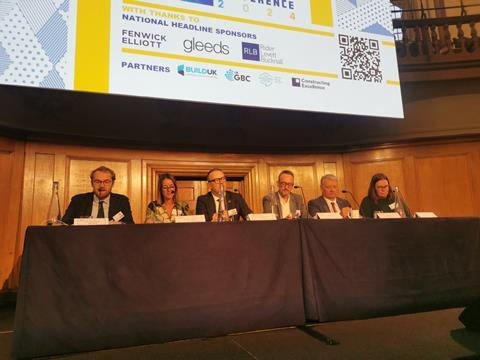Industry leaders voiced concerns about competence and resourcing challenges at the Building Safety Regulator during a panel at today’s Building the Future conference.
Speaking on a panel titled ‘The future of building safety’, Andy Mullins, head of quality at the Hill Group, said that there is a resource and competence issue at the Building Safety Regulator (BSR).
Mullins said: “I don’t think the regulator is currently competent”, stating that “a lot of their staff don’t have a great deal of knowledge in building control”.

The building safety panel at this afternoon’s event
He described Hill’s experience of the new regulatory regime so far as “not great”.
He said Hill was the first housebuilder to have gone through the gateway two process on a new build, which was approved three weeks ago.
>> See also: Industry needs to be more vocal in supporting Grenfell findings, Wates boss says
>> See also: Days of demolish and rebuild long gone, BAM chief tells conference
But he said it took 27 weeks to be approved, while another application has been pending for 31 weeks. Hill Group has a reclad scheme that has been waiting to be assessed by the BSR for 24 weeks.
Mullins mentioned that one of the registered providers Hill is working with has calculated a weekly cost of £49,000 due to the delays in passing through gateway two. He said this was “a significant viability issue” and, in this case, it will affect the RP’s ability to develop in the future.
He also said that “there is a total lack of engagement from the regulator or multi-disciplinary team either prior to application or post-application”.
Mullins said that “the only communication we get is via an email, which is not really the way we should be working in collaboration”.
He acknowledged that the regulator wants to avoid becoming embedded in the design team, and that they need to be independent, but he said “I can’t think of many other walks of life where there is this complete isolation” and “no ability to have a conversation”.
Steve Beechey, group public sector director at Wates, said that though it is “early days” for the BSR, it is “really important” that it’s resourced properly. He said there have already been delays in gateway reviews, and said “we’ve got to make sure we’re attracting the right people who want to do that sort of work”.
Beechey added that artificial intelligence needs to form part of building safety checking processes.
He added recruiting staff to the BSR “is a similar issue as with town and country planners”, and that the regulator needs to develop proper HR strategy to think about how it will attract more assessors.
The Grenfell Inquiry final report recommended that there should be a new construction regulator, which would be a single independent body and report to the secretary of state.
It also recommended that the government appoint an independent panel to consider whether building control functions should be performed by a national authority, rather than by councils.
Mullins said that even if a single regulatory body is created, skills and staff shortages will still be an issue, stating “you need experience, you can’t just come straight out of college and be expected to be an expert”.
Mike Riley, architect and technical director at the Building Design Partnership, said “it’s not just about meeting minimum compliance that the regulation says”.
He added that we should be asking, “How can we do better than that minimum?”
Riley added that changes in the industry following the final Grenfell report can only “be achieved through collaboration” and having “no blame cultures”.

